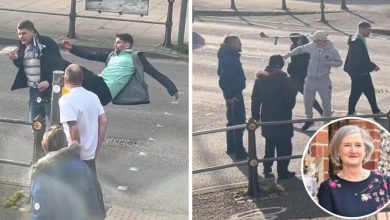Wood and plaster fly-tipped in West Earlham park in Norwich
A case of fly-tipping was recently discovered near the entrance to Enfield Road Playground in Twenty Acre Wood, West Earlham. Leon Best, a 72-year-old man who was walking his dog in the area, noticed vast amounts of debris blocking the path. The waste consisted of wood, plaster, and other building equipment, posing a potential danger to pedestrians and animals. Mr. Best expressed his anger and concern over the incident, stating that it is unacceptable to dump waste illegally instead of paying to dispose of it properly. A few days later, the debris had been moved to the grass and cordoned off with a cover.
A spokesperson from Norfolk County Council confirmed that a specialist contractor had removed the fly-tipping. Fly-tipping is considered a criminal offense and can result in penalties such as fines or imprisonment. Mr. Best emphasized the need for preventive measures to avoid similar incidents in the future. He suggested the installation of posts or bollards at the park entrance that would allow for the passage of buggies and mobility scooters while preventing vehicles from entering. The path is frequently used by people heading to the West Earlham shopping center, making the fly-tipping even more disruptive.
The discovery of fly-tipping in Twenty Acre Wood highlights a growing issue in many areas: the illegal dumping of waste. Fly-tipping not only creates an eyesore but also poses risks to public health and the environment. It often occurs in secluded areas, where perpetrators hope to go unnoticed. However, cases like the one in West Earlham remind us of the importance of community vigilance in tackling this problem. Authorities, such as Norfolk County Council, must respond promptly by removing the dumped waste and taking appropriate legal action against those responsible.
Efforts to combat fly-tipping should also include proactive measures to prevent future incidents. Installing posts or bollards, as suggested by Mr. Best, can be an effective way to restrict unauthorized access to certain areas, while still allowing pedestrians and legitimate users to pass through. Additionally, raising public awareness about the consequences and alternatives to fly-tipping may deter potential offenders. Local communities can be encouraged to report any suspicious activities or suspected fly-tipping to the relevant authorities, further enhancing efforts to combat this illegal practice.
Ultimately, the responsibility to tackle fly-tipping lies with both individuals and authorities. Individuals must be conscientious about their waste disposal habits, opting to dispose of materials properly instead of taking the easy route of illegal dumping. Meanwhile, authorities must ensure that there are sufficient disposal facilities available and that strict penalties are in place to deter fly-tipping. By working together, communities can create cleaner and safer environments, ensuring that natural spaces like Twenty Acre Wood can be enjoyed by all without disruption from fly-tipping incidents.



